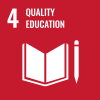Türkiye – “I love drawing food because I also love eating food,” smiles Büşra, Mutaz's five-year-old daughter, proudly opening her sketchbook. Her favourite subject at school is art.
Mutaz's family fled the war in Syria and hold temporary protection status in Türkiye, settling in the southeast. But after the earthquakes a year ago, they moved to Mersin Province, on the Mediterranean coast.
Mutaz needed to get new documents to register his children for school, alongside other challenges: earning a stable income and finding an affordable to place to live. During his search, he learned about the Mersin Municipal Migrant and Community Centre.

Mutaz helps his kids with their schoolwork. Photo: IOM/Başak Nur Yirmibeşoğlu
Run by the International Organization for Migration (IOM) and the local authorities, the centre provides counselling, psychosocial support, legal assistance, referral to basic services, and more to people like Mutaz.
The centre helped him register his children, and soon they were back in school.
This was timely for Mutaz’s eldest child, Tesnim, who had forgotten how to speak Turkish.
Tesnim wants to become a doctor and, Büşra, with her passion for food, wants to become a chef. “I want my children to achieve their dreams. That's why their education is so important to me,” he says.

Mevahib, a single mother, is completing her own education while supporting her children. Photo: IOM/Anıl Bahşi
“All children have the right to education, regardless of their migration status. Education equals opportunity, but displaced children face interruptions in their learning which can diminish their potential,” says Gerard Karl Waite, IOM Türkiye Chief of Mission. “This is critical to IOM’s goal of fostering solutions for displaced people.”
Mevahib, who left Syria six years ago, is another parent whose commitment to education knows no bounds. Her husband passed away in 2019, leaving her to take care of her two sons, Abulrahman, 7, and Eriç, 4.
Approaching the resumption of the school year, Mevahib faced administrative issues enrolling Abdulrahman. His ID number somehow matched that of another child in a different city. “Last year, he kept crying because he couldn't go to school. He was worried he wouldn’t be able to go this year either,” she says.
At the Migrant and Community Centre in the city of Şanlıurfa, near the border with Syria, she met an education counsellor, who helped her to rectify the issue. Now, Abdulrahman is happily back at school.
Meanwhile, Mevahib is doing evening courses in child development. “My dream is to find a job in my profession, in order to continue supporting my children’s education,” she says.

In the evenings, Mevahib takes time to help with her son’s homework. Photo: IOM/Anıl Bahşi
While Mutaz’s and Mevahib’s children are now continuing their learning journey, millions of migrant and refugee children worldwide remain out of school.
IOM-run migrant centres all over Türkiye are contributing to inclusive and quality education for all, a key component of the 2030 Agenda.
IOM runs six Municipal Migrant and Community Centres nationwide in cooperation with municipalities, with funding from the US Department of State’s Bureau of Population, Refugees, and Migration. The centres provide needed assistance to migrants and refugees and build cohesion in communities.
Over the past school year, IOM helped 520 migrant children continue their education.
Written by Anıl Bahşi and Başak Nur Yirmibeşoğlu, IOM Türkiye Public Information team.


